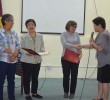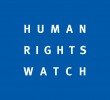10 May 2007
Source: Center for Media Freedom and Responsibility (CMFR)
Two journalists from the Foreign Correspondents Association of the Philippines (Focap) were banned from entering the Philippine Marines headquarters in Taguig City on 9 May 2007 for an arranged interview with jailed opposition senatorial candidate and former Navy officer Antonio Trillanes IV.
Focap is the organization of foreign correspondents based in the Philippines.
Douglas Bakshian of the Voice of America and Sebastian Farcis of Radio France Internationale had no choice but to leave the camp after failing to submit a clearance from the Office of the Deputy Chief of Staff for Intelligence of the Armed Forces of the Philippines.
A local court allowed Trillanes to grant interviews and to access the media for his campaigns from his detention cell. Trillanes is in prison for leading 321 soldiers in occupying a hotel-apartment building in the Makati City financial center, supposedly in furtherance of a coup attempt on 27 July 2003. The occupation ended after 18 hours later after Trillanes and fellow officers failed to rally support from the rest of the armed forces and the public.
“This is a new policy. We were just responding to the Focap notice,” Bakshian said.
ANC news correspondent Adrian Ayalin, who interviewed Marine spokesperson Lt. Col. Ariel Caculitan, said Focap did not coordinate with the military three days prior to the scheduled interview.
Bakshain stressed that he never experienced rejection when he went to military camps in Sulu and at Camp Aguinaldo before. “Well, this is the new Philippines,” he said.
This was supported by Ayalin, who said foreign media covered news in military camps before the policy was implemented.
The Public Information Office (PIO) of AFP, however, contradicted the claim. “The policy has been there since the 1950s,” chief operations of PIO-AFP, Rosenna Robles, said in Filipino. But when asked for a copy of the said policy, Robles said it was “classified information and not for public consumption”.
In a report on GMANews TV, Focap president Manny Mogato of Reuters said Marine headquarters battalion commander Lt. Col. Luciardo Obe�a showed him the policy barring foreign nationals from entering any military camp in the Philippines unless cleared by military intelligence.
Mogato said that Focap cannot do anything since it was the rule. “The only problem is we were not informed about this; and we have been covering the military for many years.”
Focap members, however, were prevented in the past from attending at least one press conference in Malacanang, the presidential palace.
President Gloria Macapagal Arroyo recently issued Executive Order (EO) No. 608, “establishing a national security clearance system for government personnel with access to classified matters and for other purposes”. The EO is being protested by, among others, the Access to Information Network for limiting public access to government information.
Under the new Arroyo EO, heads of government agencies with access to classified matters are directed to implement and institutionalize the security clearance procedure approved by the office of National Security Adviser Norberto Gonzales.
At the height of the dictatorship of Ferdinand Marcos in the 1970s, it was foreign journalists in the Philippines, together with the underground press, who freely criticized the regime, and asked officials the tough questions. But they were never banned from covering anything.
****** INBOX is an archive of press releases, statements, announcements, letters to the editors, and manifestos sent to Davao Today for publication. Please email your materials to davaotoday@gmail.com. Davao Today reserves the right to edit or refuse material for publication. *****










